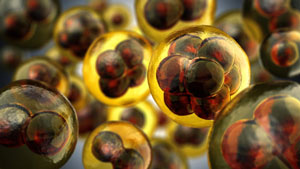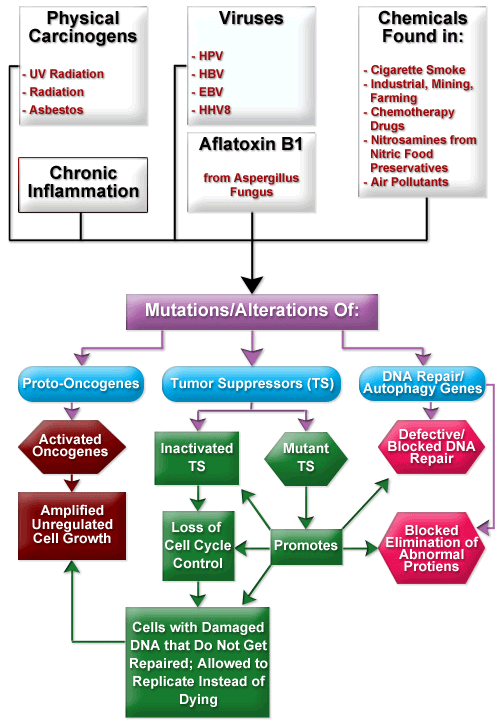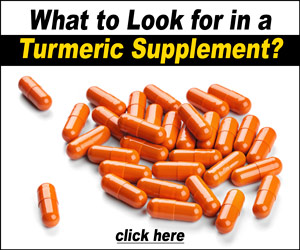How Does DNA Damage Transform Healthy Cells into Cancerous Cells?


Carcinogenesis, or the development of cancer, is a multi-step, complicated process. At the cellular level, it involves DNA damage and inflammation that disrupts the normal behavior of cells. Research shows that turmeric and its compounds can help protect against both. (vi.29, 42, 87)
DNA contains genes, the instructions for cells to make the many types of proteins and enzymes that control cell activity. These functions include: (vi.3, 29, 30, 106)
- Cell growth: Cells grow and proliferate by first going through a cell cycle. In very basic terms, during a cell's growth cycle they make duplicate copies of their DNA and then divide into replicates of themselves. Healthy cell growth is tightly regulated by a balance of specific proteins that allow a cell to move through the cell cycle.
- DNA repair: The body normally responds to damaged DNA by stopping the cell from going any further in the cell cycle and then trying to repair it. All of this is controlled by processes involving various proteins and enzymes.
- Cell death: When a cell can't be repaired, other proteins trigger apoptosis. This is a controlled, non-inflammatory cellular death that breaks the damaged cell down and gets rid of it before it can replicate mutated DNA.
Accumulated DNA mutations cause these basic cell processes to become dysfunctional. Proteins that are regulated by healthy cells become deregulated and out of balance. In turn, this can lead to uncontrolled growth, the replication of damaged DNA, and the development of cancer. (vi.29)
DNA Damage, Chronic Inflammation, and Carcinogenesis

Carcinogenesis-How Does Cancer Start?
Inflammation is part of the body's acute immune system response to events and substances that cause injury and illness, including precancerous cells. If the inflammatory process itself becomes dysfunctional and out of balance, it can fail to get rid of abnormal cells. This can lead to conditions which cause further inflammation and imbalance in the body. (vi.87)
Over time, chronic inflammation and malfunctioning cells can develop into even more serious diseases such as cancer. The process of cancer development is called carcinogenesis: (vi.87)
Many of the deregulated and/or inflammatory genes, proteins, and enzymes found in chronic inflammation are also present in cancer, including: (vi.87)
- Transcription factors that can trigger oncogenes and inflammation.
- Cytokine proteins.
- Inflammatory & metastatic enzymes.
- Cycle proteins that control cell growth and replication.
- Growth factors that stimulate cell cycle proteins.
- Cell adhesion molecules that hold cells together and help cell-to-cell communication.
- Kinase enzymes that control the rate of production for other proteins.
Some proteins and enzymes are involved in all phases of cancer—from its development to metastasis. One of the prime examples of this is the transcription factor NF-κB, sometimes referred to as the master switch for inflammation. Activation of NF-κB can trigger hundreds of genes involved in cancer. (vi.10, 33, 39, 121)
How Can Turmeric Help?
Research shows that turmeric and its compounds have antioxidant, immune-boosting, and anti-inflammatory properties that can help suppress cancer. Studies using plant compounds to inhibit cancer cells often use concentrations not found in a typical diet. However, the anticancer effects are cumulative when these compounds are combined (as they are in food). In addition, tests show that when combined, sometimes the cancer-fighting activity is even greater than the sum of the individual compounds. (vi.16, 47, 87, 134, 151-153)
The health-promoting properties in vegetables, fruits, and spices such as turmeric could help stop cancer from developing and growing. They could also be the reason why populations who eat lots of plant-based foods and spices generally have lower cancer rates. Turmeric contains a remarkable number of beneficial plant compounds, many of which have been tested against cancer cells in lab, animal, and human studies: (vi.16, 47, 87, 134, 151-153)
| ANTICANCER EFFECTS | TURMERIC COMPOUND OR FORM |
|---|---|
|
Question: How do antioxidant compounds help prevent and fight cancer? Answer: Antioxidants protect cells from turning cancerous by:
|
Question: Which compounds in turmeric are antioxidants? Answer:
|
|
Question: How do anti-inflammatory compounds help prevent and fight cancer? Answer: Compounds that fight chronic or abnormal levels of inflammation protect cells from turning cancerous by:
|
Question: Which compounds in turmeric have anti-inflammatory effects? Answer: |
Join the 1000s of People Who Are Discovering the Benefits of Turmeric.

Healthceuticals® Turmeric Curcumin Complex
100% Certified
Organic ingredients
- Organic Turmeric Extract - standardized to 95% curcuminoids.
- Organic Whole Turmeric - provides full spectrum antioxidant, anti-inflammatory turmeric benefits, including turmerones and numerous vitamins, minerals, and phytonutrients
- Organic Black Pepper Extract - standardized to 95% piperine; dramatically enhances bioavailablity.
- Organic Phospholipids - markedly improve absorption.
- Organic Ginger - works synergistically with turmeric to provide more powerful benefits.
- Absolutely FREE of potentially harmful additives and fillers such as magnesium stearate.



